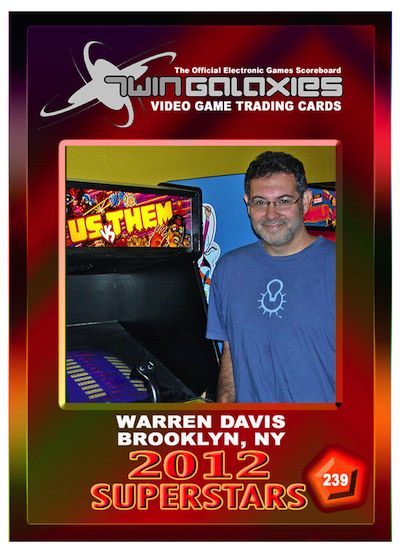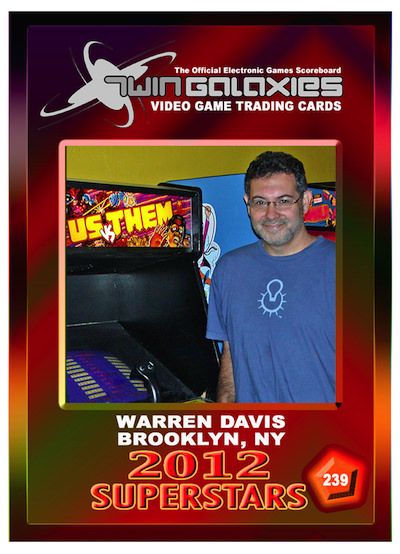- Home
- Articles
- Trading Card Spotlight
- Trading Card Spotlight Warren Davis
Trading Card Spotlight Warren Davis
Our next Trading Card Spotlight features Warren Davis, who is displayed on card number 239, from the Superstars of 2012. The designer and programmer of Q*Bert, Warren has been around the gaming industry for decades. He has worked at such companies and Gottlieb, Williams/Bally/Midway, Disney Interactive and ILM. Other games Warren worked on are Us Vs. Them, Joust 2, T2: Judgement Day, and Revolution X to name a few. His video digitization system was used on many games including Mortal Kombat and NBA Jam. Warren is still marginally involved in the videogame industry today working with Sony on PS4 projects. His future projects will involve PSVR. Warren has also worked as an actor when not involved with gaming. He has been seen in such shows as House M.D. and Criminal Minds.
What is your favorite game you have worked on in your career?
I've enjoyed all of them in one way or another. I'm not very good at picking favorites. If I had to single one out it would probably be Us Vs. Them, because we were able to combine my love of video games and my love of filmmaking in a way that was unique and innovative for its time.
Do you remember when you created your first video game or arcade and what do you remember about the experience?
Well, I remember being amazed and grateful that I landed a job making video games in the first place, and I also remember being a little overwhelmed and intimidated when it came time for me to create one because I'd never done it before and I didn't know where to begin. The game that became Q*bert evolved out of a programming exercise I gave myself, so my lack of confidence didn't get in the way too much at the beginning. There was no pressure on me because I wasn't on any schedule - I was just experimenting. Later, as the game took shape and I had to tune it, I just had to go on instinct and trust my choices. I learned a lot making that game which stayed with me for the rest of my career.
What are your opinions about today’s generation of video games? How do you compare them to older, classic games?
The graphics today are of course remarkable and far beyond what we could do. Virtually any visual style imaginable is now possible, making it a creative choice rather than using tricks to overcome technological limitations. The degree of photorealism possible is amazing. We still haven't got humans to look absolutely real, but boy are we close. The ability to network players from around the world is an amazing achievement that we could only dream of in the early 80s. And with the amount of memory available, modern games can be very deep with hours of gameplay. Storytelling in video games has advanced as well, although I believe too many games still spend too much time with non-interactive cut scenes or pseudo-interactive levels that force you into a linear story path. It's hard to compare modern game design to classic games because the technologies were so different. We had tiny amounts of memory, processors that ran like snails compared to today's CPUs, and very low pixel resolution. Plus, we were inventing the basics of gameplay which have evolved into the standards and genres of today. Still, I think there are new avenues of gameplay that have yet to be explored. It's all about the imagination of content creators.
What games today do you play and what are your favorite genres of games?
My favorite genre is adventure games. I like the idea of immersive storytelling that encompasses every aspect of interactivity... exploration, puzzle solving, action, branching narratives. But I'm pretty picky about what I like.
What does it take to be a Video Game creator, and what advice would you give a person today who would like to get into the industry?
I think the term “Video Game creator” can mean a lot of things nowadays, in that there are many entry points into the industry. Even the terms “artist, programmer and designer” are somewhat vague – there are so many sub-specialties to each. My advice would be to understand what goes into the making of a video game, see where your aptitudes and interests are, and then develop those skills further. And make use of the many available tools out there to create your own content.
Did you ever think when you were younger you would be on a Video Game Trading card?
Absolutely not. It never occurred to me there would be such a thing.
When did you first meet Walter day and where was it at?
I'm pretty sure we first met in person when he awarded me with my trading card at CGE 2012 in Las Vegas.
If you could describe Walter Day in one word, what would that word be and why?
I think I would say "iconic". His personality and image are so well-known and tied to the legacy of Twin Galaxies, that he has become something of a legend. Still, he's quite down-to-earth and fun to be around.
What is your favorite portable gaming device and why?
The only portable gaming device I've ever used is my phone.
Do you prefer Arcade or Console gaming and why?
I used to prefer arcade games back in the day, but nowadays I much prefer the comfort of playing in my own home. And I'm more of a casual gamer, so I like being able to play for short periods, save my progress, and pick up at a later time.
Are video games today aimed mainly at children, adolescents or adults?
All of the above. It depends on the game and how it's marketed. But I think the audience consists of all of those categories, and so there is content geared to each of them.
Do you believe some Video Games are too violent and lead to violence in America today?
The controversy about violence in video games has been around almost as long as there have been video games. I don't believe graphic violence is necessary to have a good gaming experience, but I also don't think violence in video games causes non-violent people to become violent. I do think there may be a small subset of the population that might be influenced in some way, but I'm not a sociologist or psychologist, so I don't have any science to build a theory on. I do think that small children should be protected from realistically depicted violent images, and that it's the responsibility of both parents and game-makers to make sure that happens.
Which company today, in your opinion, makes the best games and why?
If I was more in touch with the breadth of modern game companies, I might have an opinion on this, but I'm not and I don't.
Do you like it when Hollywood makes a movie from the video game?
If it's a good movie, sure. I don't think it's happened that often, but it's great when it does.
Who is your favorite video game character of all time and what makes that character special?
It would be too difficult for me to pick just one. I really like so many – mostly the ones I've worked on because I know them more intimately, and a handful of characters from the games I've loved over the years.
Are you still involved with gaming today, and what role do you play?
I've been doing some game-related consulting work for Sony lately, related to the emulation of PS2 games for the PS4. And there's a PSVR project that's about to get going which I'll be involved with.
Where do you see Video gaming in the next 20 years?
I'd like to see VR improve and become an accepted standard, but I don't know if it'll get there without some more R&D. I think haptic feedback technology will continue to improve and eventually become incorporated into game systems. I think the place where every gamer and game developer want to get is something approaching the holodeck on Star Trek, or the virtual world of Ready Player One. I don't know if we'll get there in 20 years, but I think that's the direction we're headed.


